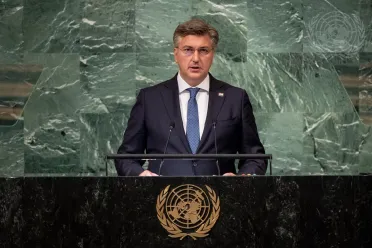Statement
Statement summary
ANDREJ PLENKOVIĆ, Prime Minister of Croatia, citing the Russian Federation’s aggression against Ukraine — with partial mobilization in effect and sham referenda — noted that three decades ago, his country was war-ravaged and in jeopardy, facing armed aggression with almost a third of its territory occupied. The Croatian people know what it means to be under attack and what it takes to defend their homeland. Today, it is an exporter of peace and stability, a humanitarian donor worldwide, a popular tourist destination, and produces the fastest electric car in the world. Success was possible, he affirmed, if one was determined and had a vision of the future. Croatia immediately and unequivocally extended support and solidarity to Ukraine — political, humanitarian, economic and military — as to do otherwise would be a betrayal of the principles and values its people hold dear. This time around, he noted, Europe and its partners came together to stand up to aggression.
While democratic systems are challenged by the fallacious and dangerous thesis that autocracy is ultimately a more efficient and pragmatic way to govern — and national dialogues are distorted by disinformation, fake news and hybrid attacks — “on the cross-road between democracy and autocracy, our choice should remain clear,” he stressed. The international community must stand united and step up efforts in reorganizing energy supply lines. “We cannot accept extortion, and we cannot be held hostage over food and energy,” he stated.
Croatia is contributing by its liquefied natural gas terminal on the Adriatic island of Krk — and beyond ensuring its own needs, is now able to supply its neighbours and other countries in Central Europe. Almost half of the country’s electricity production is already coming from renewables. Citing the intolerable imbalance in greenhouse gas emissions — the richest 1 per cent in the world are responsible for 15 per cent — he noted his Government was working to alleviate the burden of the energy crisis for households and businesses, schools and hospitals, implementing a national package worth more than 6 per cent of gross domestic product (GDP).
Ahead of the twenty-seventh Conference of the Parties of the United Nations Framework Convention on Climate Change in Egypt, the international community must strengthen cooperation to find mechanisms and financial resources to fight climate change on national, regional and global levels. He further stated that in the coming months, Croatia would join a group of only 15 other countries that are members of the European Union, NATO, the Eurozone and the Schengen area. Croatia also pays special attention to Southeast Europe, a region still not fully integrated into the European Union.
He voiced support for a prosperous and functional Bosnia and Herzegovina, progressing firmly on the path to membership. However, as Bosniak political leaders have publicly admitted they had no true intention to come to a deal over electoral reform in line with the Constitutional Court verdict, the only way forward remains for High Representative Christian Schmidt to use his powers to ensure legitimate representation and equality of Bosnian Croats in the country’s institutions. As the least numerous among the constituent peoples, he stated the Croats in Bosnia-Herzegovina demand no favours, only equality. On the international scene, “we must build, protect and defend, and stand up to those who destroy, lie and loot,” he stressed. As the world witnesses aggression and atrocities on European soil again, and the rule of power threatens to bring the world order down, “we owe it to future generations to be on the right side of history.” The international community must foster unity and stand with Ukraine in the fight for its own existence.
Full statement
Read the full statement, in PDF format.
Photo

Previous sessions
Access the statements from previous sessions.
